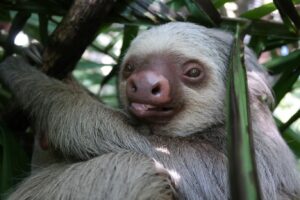
Want to have an exciting summer? Just follow graduate student Maya Kaup to the jungles of Costa Rica. This California native is spending her summer working on a research project involving sloths—the brown-throated, three-fingered and the Hoffman’s two-fingered—in Manuel Antonio.
An unusual set of circumstances brought Kaup to Oxford. Dr. Hom in the biology department needed a graduate student to research algae and fungi, but not necessarily the kind related to mammals. Kaup’s passion for many years has been investigating sloths to better understand the algae and fungi growing in their fur, which gives them a greenish hue. Kaup found a way to connect the dots between Dr. Hom’s research with algae and fungi and her interest in sloths. This connection allowed her to pursue a degree at Ole Miss.

One question Kaup seeks to answer is if the algae and fungi vary by season on the mammals. In Costa Rica there are two basic seasons, the rainy one which extends May through December and the dry which commences in January and runs through mid-May. Kaup observed the mammals in the dry season when she visited Costa Rica in January of this year.
There are actually six different species of sloths, although the two Kaup is researching are both native to Costa Rica. The hair of the sloths has unusual cracks and grooves. Maya is researching whether this cracked hair structure is why sloths have so many microorganisms flourishing in their fur.
Another point of research for Kaup and Dr. Hom relates to a sloth’s trademark—its slowness. Sloths are actually very energy efficient and conserve their energy by moving very slowly, according to Kaup. They hope to sequence the genome of the brown-throated, three-fingered sloth if their fundraising is successful. Sloths have the slowest metabolism of all mammals and sequencing its genome could uncover some of it genetic mysteries.
Individuals and organizations can make gifts to The Hom Lab to support this work at https://www.umfoundation.com/hom/. For more information or questions, please contact Dr. Hom at erik@olemiss.edu
 Steve Vassallo is a HottyToddy.com contributor. Steve writes on Ole Miss athletics, Oxford business, politics and other subjects. He is an Ole Miss grad and former radio announcer for the basketball team. Currently, Steve is a highly successful leader in the real estate business who lives in Oxford with his wife Rosie. You can contact Steve at sovassallo@gmail.com or call him at 985-852-7745.
Steve Vassallo is a HottyToddy.com contributor. Steve writes on Ole Miss athletics, Oxford business, politics and other subjects. He is an Ole Miss grad and former radio announcer for the basketball team. Currently, Steve is a highly successful leader in the real estate business who lives in Oxford with his wife Rosie. You can contact Steve at sovassallo@gmail.com or call him at 985-852-7745.

